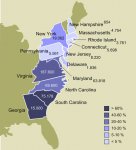Correct. The Bible as we know it wasn’t available till AD 363, the council of Laodicea.
...it sparked the reformation and changed life in the patriarchate of Rome by enabling believers to shine a spotlight on several hundred years of innovation by Roman popes as they increasingly departed from the faith once delivered to the saints...a process that continues to this day. It didn’t have the same effect on the rest of Christendom.
Correct regarding the Greeks, but I am not sure here you got this idea about literacy in Israel.
https://faculty.biu.ac.il/~barilm/articles/to_check/illitera.html
”
C. Percentage of literacy in the Land of Israel
Assessing the literacy rate in modern society is very easily accomplished but the answer to this question in antiquity is the other way around. Nonetheless, this percentage is reflected in one of the rules in Soferim 11:2 (ed. Higger, p. 218):
A town in which there is only one who reads; he stands up, reads (the Torah), and sits down, he stands up, reads and sits down, even seven times.
In other words, in some towns there was only one person who could read the Torah, which is a highly (Hebrew) religious reading.
25 This rule appears also in t.
Megilathough with a slight difference: instead of 'town' it says there: 'a synagogue of which there is only', etc.
26 However, this minor difference in the text has no significance since in the small towns in the Land of Israel there usually was one synagogue only, such as in Korazim, Beit-Shearim, and so forth. That is to say that the meaning of that rule was the same even though there was a textual difference. Calculating the balance between males and females, taking into consideration that female literacy rate is always lower than the male rate leads to the idea of there being one reader only in various places. If the fact is not overlooked that in all the synagogues that have been unearthed there was place for more than 50 people, the conclusion must be reached that while issuing that rule the Tanna was speaking of a town where the literacy rate was approximately 1 percent (if not lower).
It may be argued that the Tanna ruled in a unique case, but it seems that usually the Tannaim did not speak of rare cases. On the contrary, most if not all, of the cases studied show that the rules of the Tannaim played their role in people's lives.
27 Of course, it does not mean that in all rural places there was such literacy, but, on the other hand, if there were towns with 1% literacy, then the literacy of all the towns was not higher than 5% (at most). Therefore, taking into consideration the above rule, together with the fact that there are rules that reflect a zero literacy rate in the rural areas lead to the assumption of a low rate of literacy in the whole population. Even if we assume that in cities (as happens all over the world in urban areas in comparison to rural areas), such as Tiberias, for example, the literacy rate was double and even triple in comparison with the towns, still the figures of literacy are around 2-15%. With the assumption that the rural population was around 70% (with 0% literacy), 20% of urban population (with 1-5% literacy), and 10% of highly urban population (with 2-15% literacy), the total population literacy is still very low. Thus, it is no exaggeration to say that the total literacy rate in the Land of Israel at that time (of Jews only, of course), was probably less than 3%.
At first glance this figure looks quite low, and maybe too low. However, in a traditional society, knowing how to read was not a necessity: neither for economic reasons, nor for intellectual ones. On the contrary. Why should a farmer send his son to learn how to read when it entails a waste of working time (=money)? Why should he himself learn how to read if his culture is based on oral tradition (though with a written Torah)? According to the Torah, there is no need to read or write, except for writing the
Mezuza, Tefilin, and the Torah itself. However, for these purposes there was always a scribe, so a Jew in antiquity could fulfill the commandments of the Torah while being illiterate. Not only that, but 3% of the total population seems to be high in comparison with other cultures. In ancient Egypt, a land with a lot of scribes, only half a percent were literate.
28 Now, even if it is taken into consideration that training in hieroglyphs takes much more time than script with some 22 symbols, still the conclusion of the extent of literacy in a neighboring country some millennia later with literacy rates that are some six times larger than its predecessor, seems quite plausible.“
According to the growth processes in population and urbanization as mentioned above, it may be surmised that before the beginning of these processes, in the days of the Maccabees and at the end of the 'biblical' period, the literacy rate of the Jewish people was 1.5% if not lower. Nevertheless, if the conclusion seems farfetched, it can be rejected only by cogent arguments.”
2

